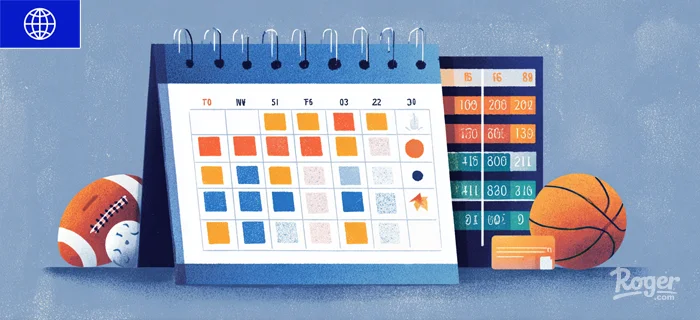Timing is everything when it comes to sports betting. Most bettors are concerned about statistics, team match-ups, or betting systems, but smart bettors know that the sporting calendar itself can influence odds as much as anything else.
Sportsbooks are moving the lines around areas of significant events, popular public opinion, and seasonal trends, then and now. But it's done extremely subtly in a way that has a tendency to catch bettors off guard.
Look at how sportsbooks utilise the sporting calendar and how bettors can use it to their benefit in this helpful guide.
Table of contents
Anticipating public betting trends
Bookmakers are aware that major sporting events, such as the Super Bowl, the World Cup, or Wimbledon finals, attract a throng of bettors. These bettors bet on sentiment, choosing in favour of popular teams or players. This produces a predictable bias in the market.
Bookmakers compensate for this by adjusting the odds a bit. They make favourites less available to wager on and enhance the underdog. This is referred to as shading the line. It helps the book to balance action on both sides of the wager with little opportunity to incur enormous losses.
Manchester United, for instance, may start at shorter than it deserves. If punters know this, they will be less inclined to overprice favourites and will be able to find fair bet value elsewhere. Platforms such as FanDuel Sportsbook will tend to reflect these movements well, particularly around busy events or leading games.
Adjusting for calendar-specific patterns
The bookmakers move their lines to reflect the calendar trends that can influence the way the games are played and the way people bet. NFL on Thanksgiving, NBA on Christmas Day, and March Madness all experience high levels of betting, particularly for newcomers or one-time bettors. In advance, books will retain lines to prevent risk and exposure to unexpected movement.
👉 There are even trends that occur historically. For instance, when games are played on holidays, trends may reflect a trend of playing at a slower pace or scoring low, especially in the NBA. This is factored into the sportsbooks when they set totals.
They also manage events such as the NBA All-Star break or trade deadline, when player exhaustion or rotation of the roster can impact the team's performance. During these windows, lines are more volatile.
These changes allow bookmakers to be competitive with market conditions and risks of increased betting levels.
Reacting to injury and lineup news
Among the most impactful reasons for line action are injury and line information. Sportsbooks generally respond rapidly if a key player is injured, suspended, or cleared medically to play.
They adjust the odds in most instances prior to the news being reported. It will help in limiting risk and assist in keeping up with high-volume betting.
The magnitude of the adjustment will vary with the significance of the player and the sport. The loss of a starting quarterback in the NFL will cause the point spread to increase by three to six points.
The loss of a primary score-getter or point passer will affect the spread and total in the NBA.
Books also adjust the over/under based on possible changes in the game. For instance, in football, if one of the defensemen is AWOL, it may result in an open game. Therefore, they adjust their total goals line.
🏀 In basketball, if a team's best scorer is out, the game may slow down, and the over/under point line goes down.
These actions are not a team matter only; it's the expected rhythm of the game. Bookmakers who are interested in injury reports will have an opportunity to get good value before the line is final. Check FanDuel Research to view the latest news on your sport.
Responding to media hype and market sentiment
Bookmakers know well enough about media and public perception, especially in the run-up to big sporting events. Recreational gamblers can be affected when the media spins a story involving a team, player or story.
Bookmakers then set the price of the event to accommodate the money entering the market based on emotion or narrative. This has nothing to do with expecting actual performance- it is all a matter of liability management.
Any best guess, social media buzz, or expert opinion can create some momentum towards the direction of one side of a wager. As an example, if an expert opines that a certain tennis player is playing in peak form, the odds can drop, even if the current stats do not necessarily agree with the claim.
It safeguards the book from unilateral action. Secondly, it ensures that the line is not unfairly skewed in favour of hype over hard facts.
Final thoughts
Understanding how a sportsbook is moving lines around major events allows you to make wiser bet choices. Typical betting trends, injury reports, media reports, and the sports calendar can typically create these movements.
🧐 Understanding when and why lines are moving provides a bettor with knowledge of when lines are being pumped up or when you are grabbing value before a line is about to shift in the market.
It's a precious advantage that is gained by observing how books manage risk, regardless of the teams involved.





